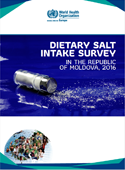Dietary salt intake survey in the Republic of Moldova, 2016 (2018)

Download
High salt consumption is an important determinant of high blood pressure and reducing it would improve health outcomes by lowering cardiovascular disease and therefore death rates. Reducing salt intake has been identified as one of the most effective public health measures and is one of the leading targets at global, regional and national levels to reduce the burden of noncommunicable diseases. The purpose of the Dietary Salt Intake Survey in the Republic of Moldova was to establish current baseline average consumption of salt (sodium), potassium and iodine through 24-hour urinary excretion testing among a random sample of the adult population (aged 18–69 years), and to assess the knowledge, attitudes, practices and behaviour around dietary salt in order to enable more efficient planning and the implementation of an effective salt-reduction strategy in the Republic of Moldova. The survey was a population-based survey of adults aged 18–69 years and carried out in three stages: questionnaire survey, physical measurements, and 24-hour urine collections. The sample for the survey was selected using a stratified probabilistic method in three stages from the master sample used by the National Bureau of Statistics, to be nationally representative. From a total of 1950 individuals selected from the sampling frame, 1307 (67%) provided suitable data for inclusion and the final sample included 858 participants.



